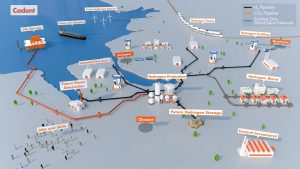NW benefits from £1bn blueprint to create green jobs and slash emissions

An ambitious blueprint to deliver the world’s first low-carbon industrial sector and more than £1bn to cut emissions from industry, schools and hospitals has been announced by the Business and Energy Secretary today (March 17).
The funding includes more than £100m for Greater Manchester Combined Authority and the region’s HyNet North West programme.
Building on the Prime Minister’s 10 Point Plan for a Green Industrial Revolution published last year, the new Industrial Decarbonisation Strategy sets out the Government’s vision for building a competitive, greener future for the manufacturing and construction sector.
Part of the Government’s path to net zero by 2050, today’s measures will create and support 80,000 UK jobs over the next 30 years while cutting emissions by two thirds in just 15 years.
The new strategy will be underpinned by supporting existing industry to decarbonise and encouraging the growth of new, low carbon industries in the UK to protect and create skilled jobs and businesses in the UK as well as give businesses long term certainty to invest in home grown decarbonisation technology, such as that which can capture and store carbon emissions from industrial plants – rather than outsourcing industrial activity to high emission countries around the world.
The blueprint also includes measures to build on the UK’s leading efforts in moving towards greener energy sources, with an expectation of 20 Terawatt hours of the UK industry’s energy supply switching from fossil fuel sources to low carbon alternatives by 2030 – helping industry to increase its use of low carbon energy sources to around 40% of industry’s total energy consumption.
To kick start the process, £171m from the Industrial Decarbonisation Challenge has been allocated to nine green tech projects in Scotland, South Wales and North West, Humber and Teesside in England, to undertake engineering and design studies for the roll-out of decarbonisation infrastructure, such as Carbon Capture Usage and Storage and hydrogen.

The model outlining future of hydrogen gas energy use throughout the region
The North West already pioneers initiatives like hydrogen energy and Carbon Capture, Usage and Storage (CCUS) through HyNet North West, which will receive almost £33m funding for two projects that aim to transform the region into a low carbon industrial cluster by 2030 – including Liverpool, Greater Manchester, Cheshire and North Wales.
The Government’s injection has been matched by a further £39m of private funding from the HyNet consortium partners.
HyNet North West will provide green energy for local homes and businesses with a blend of hydrogen and natural gas. As a result of government funding, HyNet North West aims to create thousands of new jobs by 2025, while protecting and retaining skilled jobs.
The Northern region is also taking the initiative through campaigns such as the In the Circle virtual sustainability conference in May, in collaboration with TheBusindssDesk.com, which will bring together more than 30 speakers to analyse the issues, and educate and inspire business leaders to bring about change in their companies.
Another element of today’s announcement was that, to reduce carbon emissions from public buildings including hospitals, schools and council buildings, £932m has been directed to 429 projects across England. The Public Sector Decarbonisation Scheme funds low carbon heating systems, such as heat pumps, and energy efficiency measures like insulation and LED lighting.
This includes £78.23m for Greater Manchester Combined Authority to decarbonise 15 bodies of the Greater Manchester public estate, including Transport for Greater Manchester, Greater Manchester Fire and Rescue Service, Greater Manchester Police, the Royal Northern College of Music, and various Greater Manchester community buildings, including 36 schools and 22 leisure centres.
The buildings will get extensive green upgrades, including new air source heat pumps, solar panels to generate and create their own electricity and new lighting systems.
Business and Energy Secretary Kwasi Kwarteng said: “We were the first major economy to put into law our target to end our contribution to climate change, and today we’re taking steps to be the first major economy to have its own low carbon industrial sector.
“While reaching our climate targets will require extensive change across our economy, we must do so in a way that protects jobs, creates new industries and attracts inward investment – without pushing emissions and business abroad.
“Backed by more than £1bn investment, today’s plans will make a considerable dent in the amount of carbon emissions emitting from our economy and put us on the path to eliminate our contribution to climate change by 2050.”








